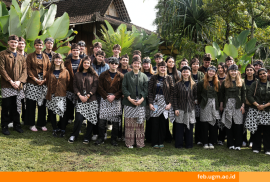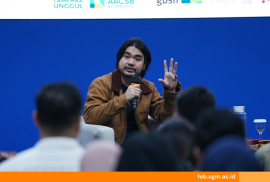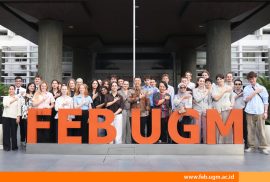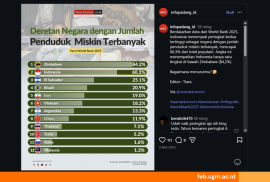More than half of the global population is living in centers of urban areas and the number is still increasing. Cities are important providers of employment. The urgency to develop green, inclusive, sustainable and resilient cities is increasing. If we don’t do it, the damage will cost us more in the future. In this regard, Task Force 8 (Task Force related to infrastructure at T20, G20 Indonesia 2022) together with Economics and Business Research and Training (P2EB) Faculty of Economics and Business UGM held a seminar with the theme “Expert Panel Dialogue for Urban Infrastructure Agenda in G20: The Need to Establish a Global Investment Platform for Urban Development Projects” on Thursday (11/08).
Think20 (T20) is the official engagement group of G20 that brings together leading think tanks and research centers worldwide. Task Force 8 of T20 is currently preparing a proposal to G20 members in establishing a global investment platform to provide a more holistic approach to urban development. The global investment platform is expected to assist integrated urban planning, provide public access to credible location-based information, improve municipal budgets and city creditworthiness, and identify urban investment priorities.
The seminar began with an opening remark regarding the introduction of topics relevant with the T20 recommendation by Prof. Danang Parikesit, as Lead Co-Chair of Task Force 8 T20. Furthermore, there was a keynote speech delivered by Bambang Susantono as the Head of the New Capital City of Nusantara Authority (IKN) which discussed urban issues exposed by Covid-19, the risks of economic recovery that created a gap between affluent and rural areas, and approaches to economic recovery that could be taken. Not only that, he also discussed the development of IKN towards a sustainable and resilient city. Besides Bambang Susantono, there was also a keynote speech by Anies Rasyid Baswedan, as the Governor of DKI Jakarta, which was delivered by Benni Aguscandra, as the Head of the DKI Jakarta One Stop Integrated Service and Investment Service.
The event continued to a panel discussion session with six outstanding experts and practitioners in their field as speakers, moderated by Dr. Fauziah Zen, senior economist at ERIA. The first speaker was Nicolas Buchoud who is President of Cercle Grand Paris de L’Investissement Durable. Nicolas gave an explanation of urban issues relevant to rapid urbanization and its relation to the concept of sustainability as well as the issue of regeneration of urban development. He also talked about new capital cities that shall be discussed in the G20 agenda and its relevance to the three main pillars of the G20, namely energy transition, global health architecture, and digital transformation.
Next is Prof. John Black’s turn from the School of Civil and Environmental Engineering, University of New South Wales, Australia, who discussed his views on the G20 leaders’ strategy to ensure cities are sustainable and contribute to the three pillars of the G20 as well as to the SDGs. According to him, there are several actions that can be taken, including bringing up international collaboration to form a UN “Sustainable Cities Panel” related to funding, then each country can form a National Sustainable Cities Commission to monitor national progress on evidence-based policy outcomes, and each city can establish an Urban Sustainability Commission to monitor the city’s progress on the targets of the SDG and G20 pillars.
In the session, Raj Kannan, the Executive Director of Deloitte Consulting Indonesia, as the third speaker discussed the concept of smart city, which is very popular today, regarding the important requirements for city leaders to implement the concept. In addition, he also shared his opinion on how he sees the role of digital technology in shaping cities and urban areas to be greener and adaptive to climate change. In the end he concludes that it is very important to have clear objectives about which elements of a smart city to achieve before city planners look for appropriate experts and technologies.
As the fourth speaker, Wang Wei, Director of Master Planning and Urbanism, Ramboll Singapore, based on his views and global experience, talked about the main challenges faced by city and state governments when they decide to implement urban development city rejuvenation, develop new cities, and how they can mitigate the challenges. the. Then, he elaborated on the practice of urban development with the 3R principles, which are restorative by facilitating health and wellness, then resilience means being able to recover and prepare for future shocks, and regenerative an environment with more emphasis on ecosystem and environmental issues.
The panel discussion session continued with the fifth speaker, namely Edwin Syahruzad as President Director of PT Sarana Multi Infrastruktur (Persero). Talking about financing which is one of the biggest challenges, according to him, it is a complex process involving various stakeholders and the public sector alone cannot fulfill the demand so private sector participation is needed. Edwin provided some of the best financing suggestions to realize partnerships between the public and private sectors, one of which is by creating a unique financing scheme based on the capacity of local governments, institutions, and stakeholders. In addition, he also discussed the global investment platform for urban development and optimistically believes that the prospects are good as long as there are common principles to be applied.
Djoko Santoso, Chief Operating Officer (COO) of PT Margautama Nusantara, was the last speaker at the panel discussion session. Djoko shared an investor’s perspective on how the city government should offer infrastructure projects that are attractive to private investors. According to him, there are three key considerations for private project participation, namely technical feasibility, commercial feasibility, and an acceptable legal framework throughout the procurement process and structure. In addition, he also discussed the challenges of escalation to international bidders and about financing the new capital city.
Reportase: Kirana Lalita Pristy.




